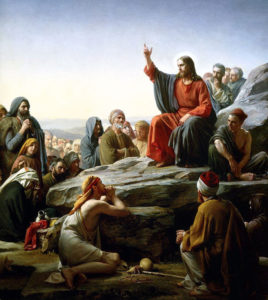Thoughts on Today’s Lessons for Feb. 5, 2017

The Sermon On the Mount (1877). Oil painting on copper by Carl Heinrich Bloch (1834-1890), Museum of National History at Frederiksborg Castle, Denmark.
If we are to follow in God’s way, we are called to be righteous, to practice justice; to be light to the world and the salt that flavors and preserves our lives. These are the themes that echo through Sunday’s readings, from Isaiah’s resounding shout to the people as they return from exile to a demolished Jerusalem, to Jesus as he continues instructing the people in his Sermon on the Mount. Isaiah insists, as Jesus will, that we go beyond personal fasting and ritual to take a stand, fighting against oppression, feeding the hungry, housing the homeless, clothing the naked. Righteousness heals our souls and lights up our lives, restoring the world as Israel restored the glory that was Zion.
Let’s take care not to read the “Prosperity Gospel” into today’s Psalm, which is an ancient worship hymn that imagines God rewarding the righteous with earthly power and riches in exchange for their good acts. Rather than counting on rewards of wealth and riches for behaving well, though, perhaps we could focus on the results of righteousness itself: When we care for the poor and the oppressed, when we act generously and show justice, we “rise in the darkness as a light for the upright.” By living justly, we become an example for others and show the way to God.
Second Reading: 1 Corinthians 2:1-16
We continue our journey through the opening chapters of 1 Corinthians, listening in as Paul offers pastoral guidance for the quarreling community. He turns their thoughts toward humility, reiterating the advice that, even if following the crucified Jesus may make us appear “foolish” to the world, in fact we share God’s secret wisdom, the Holy Spirit gives us new life through Christ.
Gospel: Matthew 5:13-20
We continue with the Sermon on the Mount. Having taught the Beatitudes to the crowd, Jesus now tells them that they, God’s people, are the salt of the earth and the light of the world. With this gift, however, comes the responsibility to show God to the world through our good works. Jesus has not come, he says, to change “the Law and the Prophets,” the ancient teaching that we now know as the Old Testament. Rather, in fulfilling the law that directs us to love God and our neighbors, Jesus calls on us to be more righteous than the Scribes and the Pharisees – groups of Temple leaders, who, in fact, often earned Jesus’ criticism for their own failure of righteousness.
